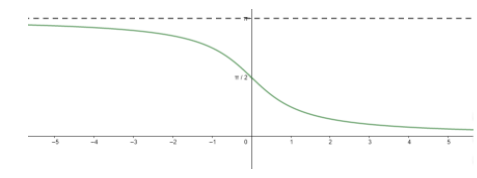Question
Question: Write the value of \({{\tan }^{-1}}\sqrt{3}-{{\cot }^{-1}}\left( -\sqrt{3} \right)\) ....
Write the value of tan−13−cot−1(−3) .
Solution
The above question is related to inverse trigonometric function and for solving the problem, you need to put the value tan−13. For finding the value of cot−1(−3) , use the property that cot−1(−x)=π−cot−1x , followed by putting the value of cot−13 to get the answer.
Complete step-by-step answer:
Before starting with the solution to the above question, we will first talk about the required details of different inverse trigonometric ratios. So, we must remember that inverse trigonometric ratios are completely different from trigonometric ratios and have many constraints related to their range and domain. So, to understand these constraints and the behaviour of inverse trigonometric functions, let us look at a graph of cot−1x .

So, looking at the above graphs, we can draw the conclusion that cot−1x is defined for all real values of x, i.e., the domain of the function cot−1x is all real numbers while its range comes out to be (0,π) .
Now moving to the solution to the above question, we will start with the simplification of the expression given in the question.
tan−13−cot−1(−3)
We know that cot−1(−x)=π−cot−1x . So, using this property in our expression, we get
tan−13−(π−cot−13)
We also know that tan−13=3π and cot−13=6π , and 3 also lies in their domains as well. So, using this value in our expression, we get
3π−(π−6π)=3π−65π=62π−5π=−2π
Therefore, the value of tan−13−cot−1(−3) is equal to −2π .
Note: It is important that you need to remember cot−1(−x)=π−cot−1x , sec−1(−x)=π−sec−1x and cos−1(−x)=π−cos−1x , while for other inverse trigonometric functions the negative sign comes out of the function directly, i.e., they are odd functions. Also, be careful about the range and domain of different trigonometric inverse functions as they are very confusing and may lead to errors.
